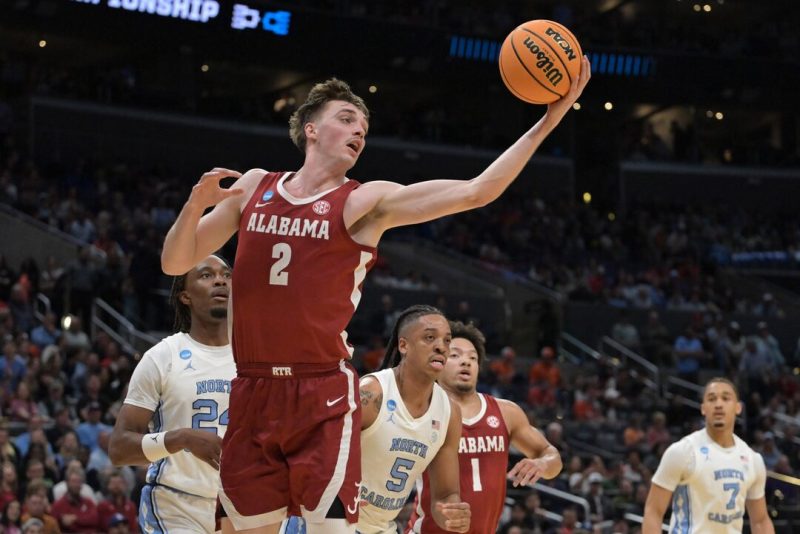March 28, 2024 – 10:35 PM PDT

LOS ANGELES — Grant Nelson scored three points in each of Alabama’s first two NCAA Tournament wins.
In the fourth-seeded Crimson Tide’s 89-87 defeat of top seed North Carolina on Thursday in an NCAA Tournament’s West Region semifinal, he posted a game-high 24 points, including Alabama’s final five.
In a game that featured 13 ties and 12 lead changes, the Crimson Tide (24-11) pulled ahead for good with 38 seconds remaining when Nelson rolled to the rim. Mark Sears fired off a pass, and Nelson scored while being fouled by Jae’Lyn Withers.
Nelson converted the and-one and added two more free throws later to cap his performance. He also grabbed a team-high 12 rebounds and blocked five shots.
Nelson credited his game-changing effort, which sends Alabama into an Elite Eight matchup on Saturday against sixth-seeded Clemson, to his team boosting him after his disappointing first two NCAA games.
“There’s all the confidence in the world (with teammates) coming up to me telling me great things,” Nelson said. “They were just saying, ‘Go out there, go get a bucket.'”
Nelson paced four Alabama scorers with at least 18 points, including Sears, who had 18. Rylan Griffen and Aaron Estrada each scored 19 points, with Griffen’s 5-of-8 shooting from 3-point range leading the Crimson Tide to 11-of-26 success (42.3 percent) from deep.
Alabama weathered a torrid start for North Carolina from beyond the arc.
The Tar Heels (29-8) knocked down 10 of 16 long-range attempts in the first half and put up 54 points by intermission. A trio of North Carolina scorers — Armando Bacot, Cormac Ryan and Harrison Ingram — reached double figures by the break.
Bacot led the Tar Heels with 19 points and 12 rebounds for the game. Ryan shot 5-for-8 from 3-point range en route to 17 points, Ingram finished with 12 points, and RJ Davis netted 14 of his 16 points in the second half.
“Their commitment to Carolina, their commitment to this program and the community — my hope is it’s talked about more,” Tar Heels coach Hubert Davis said of his team’s corps of seniors, which included Bacot, Davis and Ryan.
Despite its hot start on offense, North Carolina finished just 30-for-78 (38.5 percent) from the floor, including 12-for-32 (37.5 percent) from outside.
“I missed a few chippies. I missed a wide-open dunk,” Bacot said. “We missed some shots we usually make.”
Alabama held North Carolina to just seven points through the first 10 minutes of the second half, rallying from an eight-point deficit at the break. The comeback set up a back-and-forth closing stretch, culminating in Nelson’s key stretch in the final minute.
Crimson Tide coach Nate Oats praised Nelson’s contributions on the boards and in defending Bacot for countering claims the high-scoring Alabama team was “soft.”
The Crimson Tide came into Thursday’s matchup averaging a nation-leading 90.7 points per game but ranked No. 345 out of 351 Division I teams in scoring defense, allowing 80.9 per contest.
Up next for Alabama is a Clemson team that knocked off second-seeded Arizona in the first West Region semifinal, 77-72.
The Tigers limit opponents to 70.7 points per game, and they held the Crimson Tide to 77 in an eight-point win at Tuscaloosa, Ala., on Nov. 28.
The Saturday winner will advance to the program’s first Final Four. Each team is headed to the Elite Eight for just the second time.
Alabama lost to eventual national champion Connecticut in the 2004 Elite Eight. Clemson fell to eventual national runner-up UCLA in 1980, five years before the NCAA Tournament expanded to 64 teams.
–Kyle Kensing, Field Level Media

